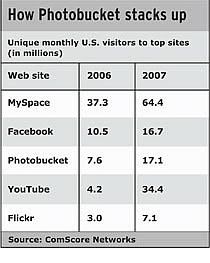Abrir artículo en el Browser. |
| Published: March 21, 2007, 4:23 PM PDT Is Photobucket the next Internet darling? By Greg Sandoval Staff Writer, CNET News.com It's one of the biggest content-sharing sites, but critics say it owes too much of its success to MySpace. |
 |
| Executives at the photo-sharing site Photobucket are fond of saying their company has one of the most visited Web sites that nobody has ever heard of. |
Photobucket's 17 million U.S. monthly visitors make it the 34th most-visited site on the Web, according to ComScore Networks. Among the top social-networking or content-sharing destinations, Photobucket's traffic only trails MySpace and YouTube and is slightly ahead of Facebook, according to ComScore figures. And the number of people storing images on Photobucket far exceeds that of higher-profile rival, Flickr. Yet Photobucket, which developed technology that allows users to post photos on blogs, Web sites and MySpace pages, is the only site among that group, other than Facebook, that hasn't been acquired. Critics say there's a good reason for that: despite the site's large audience, they aren't convinced the 4-year-old Photobucket is either a trendsetter or a potential cash cow worth coughing up big dollars to purchase. Moreover, they worry that Photobucket depends too much on MySpace. "What Photobucket doesn't have that YouTube did was a $70 billion TV advertising market behind it," said James McQuivey, a Forrester Research analyst. "Advertisers understand video. YouTube could be the cable company of the future. Photo sharing is relatively new and didn't even exist until the Internet." That's not to say Photobucket's founders are eager to sell. CEO Alex Welch said his company has a long-range plan and isn't banking on a buyout. "My philosophy is to build a standalone business," Welch said. But "if you are always looking at the best interest of the company, you're going to have strategic options. We've really got our focus on growth right now." Nonetheless, Welch and other Photobucket execs are irked by critics who say they rely too much on MySpace. To understand why, you have to look at the company's roots. Founded four years ago by engineers Welch and Darren Crystal, Photobucket was a response to online photo sites that discouraged people from sharing pictures online. The duo came up with a feature that allowed people to embed pictures on Web sites and share across the Internet, and it caught on with people who were eager to personalize their MySpace pages. YouTube, the Web's top video-sharing site, would later appeal to that crowd for the same reason. Unlike some competitors, Photobucket hasn't been plagued by issues of sexually explicit or copyrighted content appearing on the site. The company employs two centers in Colorado and Iowa where 60 people screen video and photos. The company removes content that doesn't fit those parameters, and abusive users are banned. But the danger for a company like Photobucket isn't in porn or copyright lawsuits: It's the possibility of MySpace taking a hard line against outside content by blocking it. Rumors circulated last summer that News Corp. was considering such a plan to block outside content. One MySpace executive said then, "Sure, we've thought about it, but one consideration is how users would respond if we forced them to use in-house services." The New York Times reported on Monday that MySpace has been cracking down on what kind of software tools users can embed on the site. The Times quoted an executive from MySpace's parent company saying: "YouTube wouldn't exist if it wasn't for MySpace." A MySpace spokeswoman declined to comment for this story.
 An olive branch Peter Pham, Photobucket's vice president of business development, maintains that MySpace, Photobucket and YouTube help each other. "The MySpace ecosystem is like Standard Oil and Ford motor," Pham said. "Both clearly benefited from each other. Since Photobucket gives users additional ways to express themselves, sites like MySpace benefit from the additional page views." While many in the industry credit Photobucket with successfully piggybacking on MySpace's traffic, an accomplishment many companies are trying to duplicate, they question whether offering an electronic filing cabinet for photos is a long-term business. "The question is how engaged a visitor is with a photo-sharing site," Sterling said. "The speculation is that people spend less time on a photo site than they do with a site that they check multiple times a day, such as MySpace or Facebook." Pham and Welch shrug when confronted by skepticism about their business model. "You have to remember what Google got for its $1.65 billion," said Welch at the Media Summit conference in New York last month. "They bought YouTube for the eyeballs. And we have a lot of those as well." Not only that, but Photobucket also offers video. The company is seeing between 40,000 and 45,000 video uploads daily, mostly from people uninterested in sharing their video creations with YouTube and the entire Internet. While YouTube sees more than twice that number of video submissions, Photobucket's numbers are just behind MySpace's. Photobucket, which recently topped 38 million registered users, is also trying to keep people on the site longer, a metric that advertisers like to see. As part of a partnership with software-maker Adobe, Photobucket is expected to launch a Web-based editing toolthat will allow users to blend video, photos and music. The music comes from Pump Audio, which licenses independent music and announced an agreement with Photobucket earlier this month. Photobucket's Welch also said his company has already had a few profitable quarters, and he expects it to stay that way by the third quarter of this year. Maybe then someone will pay attention. |
|
domingo, agosto 12, 2007
"Photobucket" Manejador de imágenes en ASP
Suscribirse a:
Comentarios de la entrada (Atom)
No hay comentarios.:
Publicar un comentario